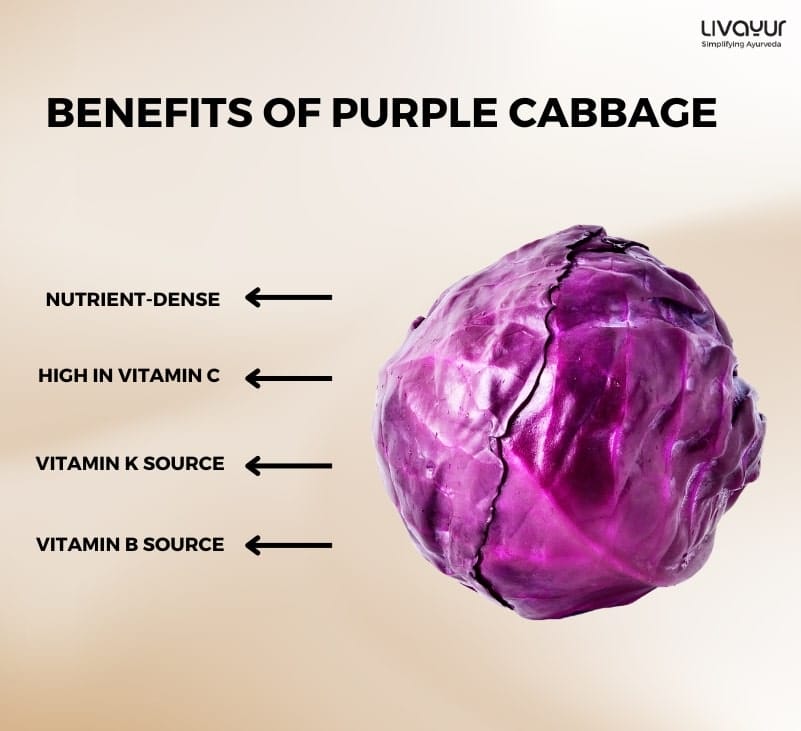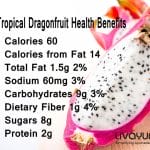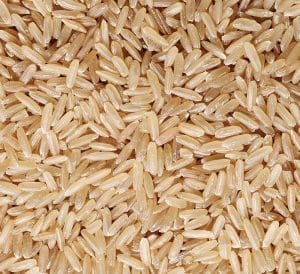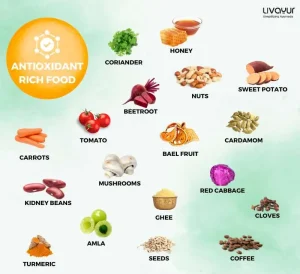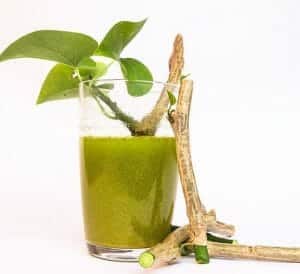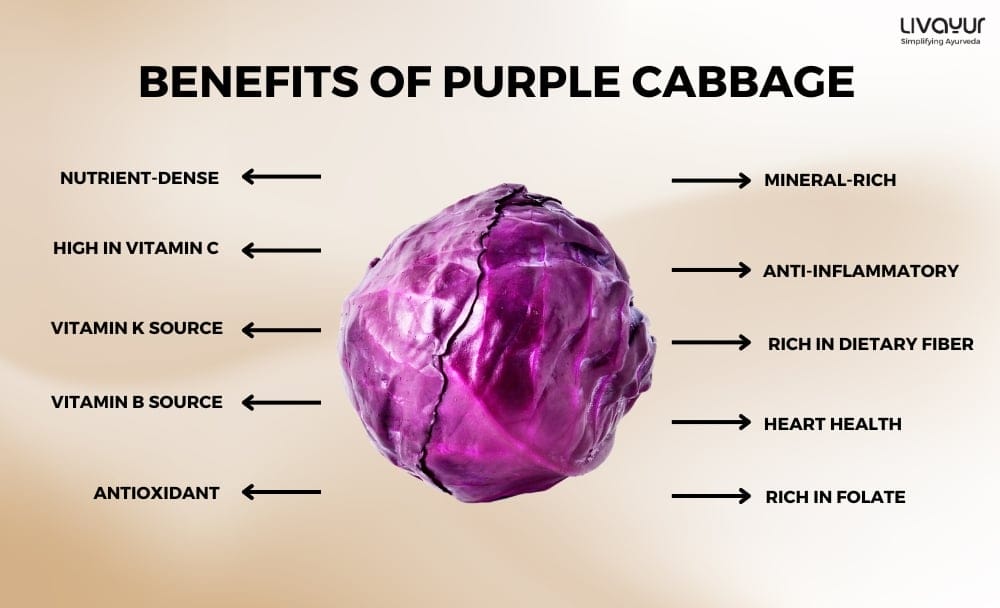
Purple cabbage (Brassica oleracea var. capitata f. rubra) is a winter season’s vegetable and is different from white cabbage in case of head and leaf colour. It comes with a vibrant hue and distinct flavor. It is a colorful addition to your plate and brings a powerhouse of nutrients. Packed with vitamins and minerals, purple cabbage offers several benefits that make it a vital addition to any balanced diet.
Most of the articles you will find on the internet are about the worm or parasitic infestations in cabbage and the side effects that come along with it. However, not this article!
This article explores the ten proven benefits of purple cabbage. We also suggest incorporating this versatile vegetable into your meals for a healthier and more vibrant lifestyle.
What is Purple Cabbage?
Purple Cabbage, scientifically known as Brassica oleracea var. capitata f. rubra, is a member of the Brassicaceae family. It is closely related to other cruciferous vegetables like broccoli and kale. This cabbage gets its rich color from pigments called anthocyanins, which are potent antioxidants.
The vibrant vegetable features tightly packed leaves with a dense texture and a slightly sweet and earthy flavor. It is widely cultivated in many parts of the world and is a popular ingredient in various cuisines due to its versatility and nutritional value. [1]
Let’s find out all about the nutrients in Purple Cabbage in the next section.
Purple cabbage has a lot of beneficial plant compounds and exhibits a large antioxidant activity. Probably, largest when it comes to anti-oxidant activity in vegetables.
Nutritional Value of Purple Cabbage [2]
Nutritive value of red cabbage per 100 g of edible portion is as follows:
| Constituents | Quantity |
| Water | 90 gm |
| Protein | 2 gm |
| Fat | 0.2 gm |
| Sodium | 26 mg |
| Calcium | 42 mg |
| Iron | 0.8 mg |
| Vitamin A | 40 I.U. |
| Thiamine | 0.09 mg |
| Riboflavin | 0.06 mg |
| Ascorbic Acid | 61 mg |
| Carbohydrates | 6.9 g |
| Energy | 31 Kcal |
Red cabbage is a great source of nutrients and it possesses anti-cancerous properties. It also has some vitamin C content which makes our bones ber and prevents us from scurvy. Now, let’s explore the benefits of purple cabbage in depth.
10 Incredible health benefits of purple cabbage
Purple cabbage offers the following health benefits that make it a nutritional powerhouse: [1]
1. Abundant in nutrients
It comes with vitamins, minerals, and phytochemicals. It can be a nutrient-dense addition to your diet.
2. High vitamin C content
Surprisingly, Purple Cabbage is super rich in Vitamin C. It helps support immune function and promotes healthy skin. It also makes our bones ber. Vitamin C is a very important anti-oxidant for our body that has a lot of benefits.
Do you know? Purple Cabbage has more vitamin C than an orange per serving.
3. Excellent Vitamin K source
A single serving can provide 61% of your daily vitamin K needs. It is necessary for bone health.
4. Abundance of B vitamins
It includes healthy amounts of vitamin B5 (pantothenic acid), vitamin B6 (pyridoxine), and vitamin B1 (thiamin). They play vital roles in energy production and nerve function.
5. Antioxidant powerhouse
Loaded with antioxidants, it helps combat oxidative stress and protects cells from the damage done by free radicals.
6. Mineral-rich Addition to Diet
It is abundant in essential minerals like potassium, manganese, iron, and magnesium. These are crucial for various bodily functions.
7. Shows Anti-inflammatory properties
It contains anti-inflammatory nutrients like anthocyanins, which may help reduce inflammation and support overall health.
8. Cancer prevention
Thanks to its impressive array of phytochemicals and antioxidants, it has potential cancer prevention benefits.
9. Dietary fiber
It is rich in dietary fiber. It promotes digestive health and aids in preventing colon cancer, high cholesterol, diabetes, and obesity.
10. Cardiovascular protective properties
It helps keep the heart function healthy due to the presence of anthocyanins.
How to consume purple cabbage
Here are some ideas on how to consume purple cabbage:
1. Raw and crunchy
It can be thinly sliced or shredded and enjoyed in salads or as sandwich topping. Its vibrant color adds a visual appeal to any dish.
2. Roasted or grilled
Roasting or grilling it brings out its natural sweetness and enhances its flavor. Cut the cabbage into wedges or thick slices, drizzle with olive oil, sprinkle with seasonings of your choice, and roast in the oven or grill until tender.
3. Stir-fried or sauteed
It can be a delicious addition to stir-fries and sautés. Slice it into thin strips or shred it and cook it quickly in a hot pan with your favorite stir-fry ingredients.
4. Steamed or boiled
Steaming or boiling it preserves the vibrant color and texture while retaining its nutritional benefits. Cut the cabbage into wedges or small pieces and steam or cook until tender.
5. Juiced or blended
Consider juicing or blending it with other fruits and vegetables for a refreshing and nutrient-packed beverage. Combining it with apples, carrots, or ginger creates a vibrant and healthy drink.
Purple Cabbage is also used for food processing or garnishing to increase the aesthetic value of food/beverages.
Purple Cabbage: Cooked v/s Raw
Now, the question will definitely arise – Should we intake purple cabbage, raw or cooked? Well, let’s put a pin in that. First, we present you with a comparative analysis of Raw Purple Cabbage and Cooked Purple Cabbage and then maybe, we can answer your question:
| Raw Purple Cabbage has more vitamin C. Some of the vitamin C in cabbage can be lost when it is cooked. Vitamin C is an important antioxidant that is better retained in raw cabbage. |
| Cooked Cabbage is more rich in antioxidants called Glucosinolates. On cooking, the anti-oxidant activity increases which makes it more potent as an anti-carcinogenic. |
| When it comes to the fiber content, it almost remains the same for both raw as well as cooked purple cabbage. |
| Minerals like calcium may be more bio-available in cooked cabbage. Cooking can increase the gut’s ability to absorb nutrients. |
| The amount of digestive enzymes in raw cabbage is higher. When food is cooked, these enzymes are eliminated. |
Overall, both cooked and raw cabbage offer a lot of nutritional benefits. For best results, you must incorporate cabbage in your diet in both forms – have raw cabbage salads and coleslaw as well as lightly steamed or sautéed cabbage dishes. That should be your answer.
Purple cabbage and Ayurveda
Purple cabbage has gained recognition in Ayurveda due to its health benefits. According to Ayurveda, it is cooling in nature, aids digestion, and supports detoxification. It is a light food that promotes mental clarity and balances doshas.
Cooking it with complementary spices and herbs tailored to individual Doshas can help. While Ayurvedic principles provide valuable insights, consulting with an Ayurvedic practitioner for personalized guidance on incorporating them into your diet is essential.
FAQs
1. What is the difference between purple and green cabbage?
Purple cabbage and green cabbage differ primarily in color. Purple cabbage contains anthocyanins, which are powerful antioxidants associated with reducing inflammation and promoting heart health. Green cabbage is rich in vitamins C and K and folate, which support immune function and bone health. Both types offer unique nutritional benefits, making it beneficial to include both in your diet for a well-rounded nutrient intake.
2. What is purple cabbage good for?
It is suitable for a variety of reasons. It comes with vitamins, minerals, and antioxidants. Furthermore, it can boost immunity, promote heart health, aid digestion, provide anti-inflammatory benefits, and potentially help prevent certain types of cancer.
3. Which cabbage is healthier?
Both purple and green cabbage are highly nutritious, and their health benefits are comparable. The choice between the two comes down to personal preference and the specific nutritional needs of an individual. Incorporating a variety of colorful vegetables, including purple and green cabbage, can provide various nutrients.
4. Can I eat cabbage every day?
Cabbage is generally safe to eat every day. However, it is essential to consider individual dietary needs and potential sensitivities. Cabbage is a cruciferous vegetable that can sometimes cause digestive discomfort or gas in some individuals. Moderation and listening to your body’s response are critical. If you have dietary restrictions, it’s advisable to consult a healthcare professional or nutritionist.
5. What are some popular purple cabbage recipes?

A refreshing and crunchy slaw made with shredded cabbage, carrots, and a tangy dressing.
Slice the cabbage into wedges, drizzle with olive oil, season with herbs and spices, and roast until tender and caramelized.
Stir-fry thinly sliced cabbage with your favorite vegetables, protein, and seasonings for a quick and nutritious meal.
Combine cabbage with mixed greens, fruits, nuts, and a flavorful dressing for a vibrant and nutritious salad.
Conclusion
Purple cabbage proves to be more than just a visually striking vegetable – it offers impressive health benefits. Purple cabbage deserves a prominent place on your plate. It is primarily due to its abundance of vitamins, minerals, and antioxidants to its potential cancer-fighting properties and role in promoting digestive health.
Whether enjoyed raw in salads or cooked in various delicious recipes, you can incorporate this versatile vegetable into your diet in numerous delicious ways. So, why not harness the power of purple cabbage and embrace its nutritional prowess for a healthier lifestyle? Give this vibrant cruciferous vegetable a chance, and reap the rewards it has to offer.
Disclaimer
The information provided here is not intended to replace professional advice or treatment.




